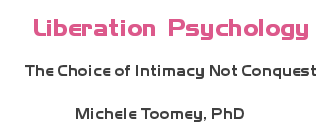For Teachers: Strategies for Dealing with Stressful and/or Abusive Interactions
© 1995 Michele Toomey, PhD
Philosophy/Psychology Underlying Your Response
Remember:
- That you are not an enemy, and neither is the offending other person.
- That you want to discover why you are being spoken to in a hostile or abusive manner.
- That this understanding will help you not to react with hostility.
- That you will try to add to the clarity by claiming whatever was going on for you when the interaction began and as it transpired.
- That you will try to work creatively with the information you discover and move it to a different place.
- That fairness is what you are trying to afford and receive.
- That you want to stop the stressful and/or abusive nature of the interaction.
- That you will ask for help if fairness can't be arrived at and a sense of mutual respect for each other's feelings and rights can't be found.
- That you have a right to refuse to tolerate certain abusive interactions that cross your personal line and haven't been able to be satisfactorily resolved.
- That the relief of integrity, accountability, understanding and clarity leading to fairness and mutual respect is the power you are relying on to move things.
You need to be committed to the discipline it takes to bring this orientation rather than the reactive response that is so easily and automatically triggered, answering fire with fire, anger with anger, hostility with hostility, or hurt and withdrawal, or trying to raise the ante by immediately using the power of authority and punishment, barring such an outrageous treatment of you that immediate authority is what is absolutely necessary.
Specific Suggestions to Certain Types of Situations:
- You greet another with a pleasant manner and are ignored or spoken to with a hostile or abusive comment.
- Ask yourself how offended you are.
- Ask yourself how offensive the act/words are.
- Depending on the answers you give yourself choose from among the following options:
- Ignore the exchange.
- Ask why you received that response.
- Express hurt/anger/frustration/surprise and then ask what's going on.
- Stop short and express outrage/shock/disbelief at the response, make a more formal opportunity for a confrontation and ask why you were spoken to in such an offensive manner and work hard, firmly and creatively to arrive at a fair and restored respectful place.
- Follow-up with a consequence if it feels warranted.
- Report it and ask for help.
- You ask students to stop doing a certain behavior and they ignore you or speak to you hostilely or abusively.
- If ignored:
- Try being light and cajole them into stopping.
- Give them a few minutes and then quietly remind them again.
- Be firm without anger.
- Ask them why they're doing what they're doing and why it's not easy for them to stop.
- Hang in there and get their attention and their compliance.
- If verbally attacked:
- You need to bring stability and firmness.
- Attempt to diffuse the situation by not reacting angrily. Ask the students to take time out to regain control of themselves. Do not address the behavior directly at this time. They can't hear and can't necessarily stop themselves at this time and you don't want to fan the fire. The first order of business is to contain the situation and help the students gain control of themselves. Your personal feelings of being attacked is secondary, not because your feelings don't count but they can't be addressed first.
- Do whatever possible to treat the students' ignited feelings respectfully without getting caught in the content. They are very upset as well as very abusive. We're trying to teach them how to express upset and anger without being abusive. We're also trying to teach them how to control themselves and they find this impossible at times. Firmness with fairness (but without anger) is the force we're trying to get them to respond to. It is a very powerful and safe combination.
- Only after the students are calmed down can you dialogue with them about what happened. You want to discover and understand not lecture or reprimand, accuse or counter-attack.
- As the students expose themselves you need to listen attentively and try to learn something new about how they got triggered. Your first responsibility is to contain them and attend to them. Speaking honestly and being respectfully listened to, will have (hopefully) a calming affect on them. Then they will recognize they're being treated fairly and be in a position to care about you and your feelings and the fact that they abused you verbally.
- Remember, your feelings come last not first, because in that position there's a chance for you to get your turn. Your anger should be very contained and not your first response. It's not about you. It's about them. They're out of control. They need help. You just got caught in the explosion. We're trying to teach them not to explode. When they do, we want them to regain control and then address what occurred.
|



